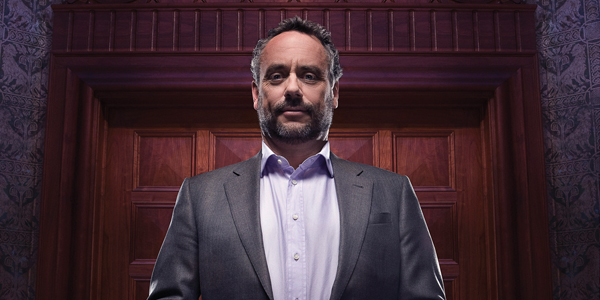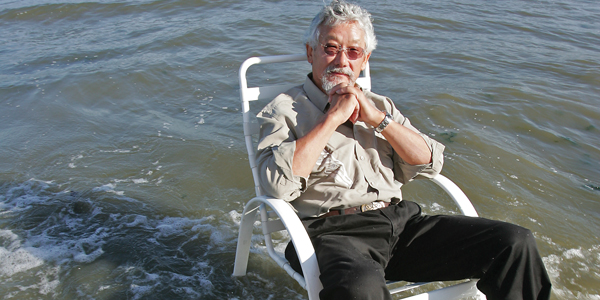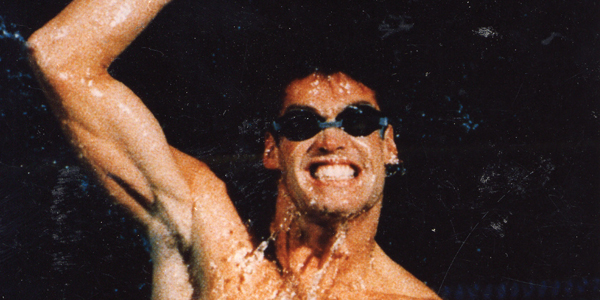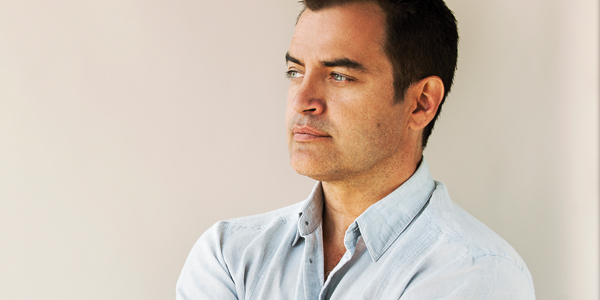I understand you studied to become a doctor and thought yourself destined for medical school. When that didn’t unfold as planned, how did you skip into ice cream?
Well, after being rejected (laughter), from so many medical schools, I got a job as a lab technician in a biochemistry research lab (so that I could fortify my resume) and then I actually reapplied to medical school a second time. I didn’t get in again and, at that point, I reconnected with Ben, a friend from junior high school and high school, and we just decided to do something that was fun – where we could work together and be our own bosses. We had always liked to eat quite a bit, so we just thought we would do something with food and picked ice cream.
(Laughing) Nothing wrong with pursing something you’re passionate about! I know you’ve been longtime friends with Ben, and so I wondered what you believe the key ingredients to a successful partnership are?
For us it was definitely being friends more so than just business partners. We had a long history, we had complete trust in each other, and I think we also had different skills. Ben is very creative, he loves trying new things – doesn’t mind failing, so he’s somewhat of a classic entrepreneur and I am much more interested in finding manageable things to do. Ben created all the flavors, did all of the marketing for the company. I used to make the ice cream and would sometimes have to say, “No” to Ben (laughter).
And how steep was your learning curve when you started this company? I think I read somewhere that you took an online course in ice cream making and then off you went. So it sounds to me that Ben said, “Let’s jump in!” and you said, “Well, if it’s manageable let’s go!” So how steep was that learning curve?
It was very steep, but we didn’t really think of ourselves as going into business. We thought of ourselves as opening up an ice cream parlor and so we didn’t really expect that we would know anything.
I think that one of the challenges was that neither one of us had any sort of business training or business background. The business part of it was a little more challenging, but making ice cream and figuring that part out was actually very enjoyable.
I love demystifying the myth that entrepreneurs know what they’re doing when they start their business. Most entrepreneurs jump in the game, get their stick on the ice, and figure it out when they get there! But looking back in hindsight, what pieces really needed to be put in place quickly so that you could grow it?
Well first of all, it didn’t really happen all that quickly. It may seem quickly now, looking back, (laughter). I think Ben and Jerry’s was an artistic success early on but we had no idea about the business part – we weren’t making any money. Our goal was to stay in business.
I think that getting people into the company who had some business expertise but who were also entrepreneurial – who shared the values of the company – was critical. I think the part about sharing values was really the most critical piece.
There are, I think, a lot of people with good business skills, but to find people who shared the mission of the company, which was not just to make money but was to make a great product and also be involved in the company, finding those pieces that went along with the business skills was what made it happen.
When you say “finding those people,” do you feel like you attracted them, or did you have to go out and find them? I mean, you were so secure in knowing what you were trying to accomplish, do you feel you attracted the people to work with you?
Well, it was some of both. I think when the business was growing and becoming successful, that attracted a number of different people because they were in different elements of it. The idea of the business in and of itself is very attractive, and ice cream is our product, and that’s attractive, and so it’s not always clear why people are attracted to a business. There were lots of people who were attracted to the company who shared the social values of the company, and in some cases, we had to go out and seek people.
In terms of your social values, do you think that played a huge part in terms of your brand differentiation related to marketing?
I do think it did. I think having what we call a three part mission, where there’s a social mission that’s equally important to the financial mission and the product mission, really created the company as it is. And I’m not sure that it really drove the success of the company – certainly if the ice cream wasn’t
delicious, no matter how wonderful and caring a company it was, people wouldn’t have bought the ice cream – but it allowed the company to have a different kind of relationship, both with employees and with customers, that was more than just about a delicious product – it went much deeper than that.
And do you see that as a sort of pattern in terms of successful businesses, where there’s a measurement of why you do what you do; the intention of it?
You know, I think it’s different for different businesses.
I think there are any number of ways to have a successful business. You can have a business, such as Ben & Jerry’s, that tries to combine social and environmental concerns with the business aspect and that can be very successful. You can have businesses that don’t care at all about social values – they’re simply in business to make money – and those can be very successful as well.
I think that the lesson for me from Ben & Jerry’s is that, if you want to integrate social and environmental concerns into a business, you can do that and still be very successful. That’s counter to the conventional business thinking which is that, if you want to have a caring business and a giving business, that takes away from the business’s ability to be successful. That’s just not our experience.
Early on in the business you seem to have understood the link between engaging employees and understanding that their happiness is connected to employee retention. What programs did you implement into your business that you know contributed to that success? What was the Ben & Jerry’s Joy Gang, what engaged employees so that they wanted to stay?
The earliest thing was just giving people ice cream.
(Laughter) Seems so simple, doesn’t it?
(Laughter) It does… and when people are working around ice cream all day they want to eat it, they want to taste it, and so it seemed like a good thing to do. Later on, we did establish the Joy Gang, which is a volunteer group of people at Ben & Jerry’s who take it upon themselves to try to figure out ways to bring more fun into the workplace.
And I think what’s been good about that is, first of all, they get a budget – you’ve got to put resources into having fun, you can’t just expect it to happen – and second, there’s no management interference – whatever the folks want to do, assuming that it’s legal (laughter), they get to go ahead and do it. I think a lot of it’s around food and celebration.
…and that it’s not contrived, for sure…
No it’s not contrived! (interrupting) – It’s people trying to bring more fun into their jobs, I mean, when people spend eight hours a day, or ten hours a day at work, it’s a major part of your day. It shouldn’t be a complete burden.
Absolutely! Talk to me about choosing the more inclusionary title for “Chubby Hubby” ice cream to “Hubby Hubby” ice cream. How did that come to be?
That was following the passage of a law here in Vermont that allowed same sex marriages.
Ben & Jerry’s has a history of inclusion and looking at civil rights and human rights and wanted to celebrate the passage of that law so the company renamed (or symbolically named) a sundae from “Chubby Hubby” to “Hubby Hubby”. You know, it’s kind of interesting, the company got a lot of feedback about that, both positive and negative. It turns out, it’s a controversial issue that people feel very deeply about; for many people it’s a religious issue.
Ben & Jerry’s had no desire to alienate people or to get people upset, but the company felt that it was an issue that was important.
It was about civil rights and human rights and you need to take a stand to protect the rights of people who are not often given those rights.
Which really leads into what I wanted to talk about next. I really want to know why it is that you see the importance of taking a public stand on issues. And, you’re not afraid of those ramifications – I love that!
It’s about challenging the status quo. So many companies are looking at how their negative PR is going to affect the bottom line but, you’ve protested oil drilling, you’ve spoken out about cloned animals in American food (laughter) and off you went on the “Hubby Hubby” ice cream crusade. It seems to me that the company refused to operate from a basis of fear. Instead, you said, “No, this is an important thing to follow through on” and you did!
I think a lot of that comes from Ben. Ben is very comfortable being outspoken about issues. He feels very strongly about people who don’t typically have voices or who are not heard in our society and about people who are the most vulnerable, who need to be protected. I think the first issue that the company got involved in was back in the 80s, during the height of the civil war, when Ben & Jerry’s came out with a chocolate-covered ice cream bar on a stick; we called it a “Peace-Pop”, and we took the opportunity to talk about all of the money that’s spent on our military, taking money away from human needs and social needs.
There was a lot of concern about the company when we first did it, that we would make people mad, or have grocers or distributors boycotting the product, but we just felt like it was an important thing to do.
I think that what’s interesting is that even people who didn’t agree with the position the company took respected the fact that Ben & Jerry’s was willing to speak out, about an issue that was not in its own self-interest. I think that’s the big thing.
While businesses are always very involved politically and very involved with issues, they just do it for reasons that will help them make more money. Here was a company that was willing to speak out about an issue that was not about making more money, it was about what it felt was right.
When you look back on Ben and Jerry’s, which marketing strategies do you feel you executed exceptionally well? In hindsight, was it the cow mobile that ended up blowing up (laughter) or the free cone day or… What sort of snapshots – great memory shots in your mind – do you have that make you smile?
Well, first of all, it was Ben that did all of the marketing…I’d love to take credit but it really wasn’t me!
(Laughter) Ok, so when you look back, what do you consider the most successful in terms of marketing?
(Interrupting) I think that what Ben is so good at, is connecting with customers in a human way, in a non-corporate, almost anti-corporate sort of way. We always try to run a business the way regular people would run a business and not the way corporate folks would run a business.
So you know, as you said, the idea of the cow mobile where Ben and I were out scooping ice cream to people, we had free festivals where we brought in music, combined it with ice cream, and also invited non-profit organizations to come and do education. I think finding ways to combine ice cream with fun and with social causes has been a really good combination.
And so, what marketing advice would you have for members of organizations or the entrepreneurs reading the publication? What would you tell them?
I would say, first of all, to do things that you love and are passionate about, not simply just to make money. It’s much better to be doing things that you actually believe in. And, you know, going back to what I said before, we always tried to be more human and appear more approachable than most businesses. I think most businesses, or many businesses, try to appear very professional and polished and give that impression. We felt like we wanted to be more genuine and authentic – I think that’s what people look for.
And how are you spending your time today?
I spend about half my time at Ben & Jerry’s still. I do some public speaking and I work with some non-profits as well.
Out of those things, what makes your heart sing the most?
(Laughter) It’s still when I get to meet people. As much as the work we’ve done is about issues, I am much more motivated by relationships with people than I am about issues.
I know that, between the two of you, you’ve won numerous awards. What do you consider your greatest accomplishment to date?
I think helping people see the role of business as different from the way it’s always been looked at. You know, I think business has tried to define itself as an entity that provides services or produces products and we’ve tried to define business as having a different role in society that can address social and environmental problems.
Now this is the question that I always ask at the end of every interview. Most of the time I get a good laugh but then I usually get a really good answer, so here it is: If you had one piece of advice that you know could fundamentally change the world as we know it, what would it be?
… You get good answers for that? (laughter)
Yeah, but they end up very simple. So in your words, what is your answer that would fundamentally change the world as we know it?
More love.
Most people have this big laugh and they say, “What a loaded question!” (laughter) But then a simple answer, one or two words (laughter) generally come to mind, and it comes to them quickly.
Thank you so much for sharing with me today.
Thank you so much! Good talking with you!






